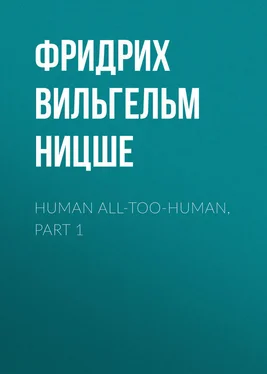Фридрих Ницше - Human All-Too-Human, Part 1
Здесь есть возможность читать онлайн «Фридрих Ницше - Human All-Too-Human, Part 1» — ознакомительный отрывок электронной книги совершенно бесплатно, а после прочтения отрывка купить полную версию. В некоторых случаях можно слушать аудио, скачать через торрент в формате fb2 и присутствует краткое содержание. Жанр: Философия, literature_19, foreign_antique, foreign_prose, на английском языке. Описание произведения, (предисловие) а так же отзывы посетителей доступны на портале библиотеки ЛибКат.
- Название:Human All-Too-Human, Part 1
- Автор:
- Жанр:
- Год:неизвестен
- ISBN:нет данных
- Рейтинг книги:4 / 5. Голосов: 1
-
Избранное:Добавить в избранное
- Отзывы:
-
Ваша оценка:
- 80
- 1
- 2
- 3
- 4
- 5
Human All-Too-Human, Part 1: краткое содержание, описание и аннотация
Предлагаем к чтению аннотацию, описание, краткое содержание или предисловие (зависит от того, что написал сам автор книги «Human All-Too-Human, Part 1»). Если вы не нашли необходимую информацию о книге — напишите в комментариях, мы постараемся отыскать её.
Human All-Too-Human, Part 1 — читать онлайн ознакомительный отрывок
Ниже представлен текст книги, разбитый по страницам. Система сохранения места последней прочитанной страницы, позволяет с удобством читать онлайн бесплатно книгу «Human All-Too-Human, Part 1», без необходимости каждый раз заново искать на чём Вы остановились. Поставьте закладку, и сможете в любой момент перейти на страницу, на которой закончили чтение.
Интервал:
Закладка:
SECOND DIVISION
THE HISTORY OF THE MORAL SENTIMENTS
Advantages of Psychological Observation. – That reflection on the human, all-too-human – or, according to the learned expression, psychological observation – is one of the means by which one may lighten the burden of life, that exercise in this art produces presence of mind in difficult circumstances, in the midst of tiresome surroundings, even that from the most thorny and unpleasant periods of one's own life one may gather maxims and thereby feel a little better: all this was believed, was known in former centuries. Why was it forgotten by our century, when in Germany at least, even in all Europe, the poverty of psychological observation betrays itself by many signs? Not exactly in novels, tales, and philosophical treatises, – they are the work of exceptional individuals, – rather in the judgments on public events and personalities; but above all there is a lack of the art of psychological analysis and summing-up in every rank of society, in which a great deal is talked about men, but nothing about man. Why do we allow the richest and most harmless subject of conversation to escape us? Why are not the great masters of psychological maxims more read? For, without any exaggeration, the educated man in Europe who has read La Rochefoucauld and his kindred in mind and art, is rarely found, and still more rare is he who knows them and does not blame them. It is probable, however, that even this exceptional reader will find much less pleasure in them than the form of this artist should afford him; for even the clearest head is not capable of rightly estimating the art of shaping and polishing maxims unless he has really been brought up to it and has competed in it. Without this practical teaching one deems this shaping and polishing to be easier than it is; one has not a sufficient perception of fitness and charm. For this reason the present readers of maxims find in them a comparatively small pleasure, hardly a mouthful of pleasantness, so that they resemble the people who generally look at cameos, who praise because they cannot love, and are very ready to admire, but still more ready to run away.
Objection. – Or should there be a counter-reckoning to that theory that places psychological observation amongst the means of charming, curing, and relieving existence? Should one have sufficiently convinced one's self of the unpleasant consequences of this art to divert from it designedly the attention of him who is educating himself in it? As a matter of fact, a certain blind belief in the goodness of human nature, an innate aversion to the analysis of human actions, a kind of shame-facedness with respect to the nakedness of the soul may really be more desirable for the general well-being of a man than that quality, useful in isolated cases, of psychological sharp-sightedness; and perhaps the belief in goodness, in virtuous men and deeds, in an abundance of impersonal goodwill in the world, has made men better inasmuch as it has made them less distrustful. When one imitates Plutarch's heroes with enthusiasm, and turns with disgust from a suspicious examination of the motives for their actions, it is not truth which benefits thereby, but the welfare of human society; the psychological mistake and, generally speaking, the insensibility on this matter helps humanity forwards, while the recognition of truth gains more through the stimulating power of hypothesis than La Rochefoucauld has said in his preface to the first edition of his " Sentences et maximes morales." … "Ce que le monde nomme vertu n'est d'ordinaire qu'un fantôme formé par nos passions, à qui on donne un nom honnête pour faire impunément ce qu'on veut." La Rochefoucauld and those other French masters of soul-examination who have lately been joined by a German, the author of Psychological Observations 4 4 Dr. Paul Rée. – J.M.K.
resemble good marksmen who again and again hit the bull's-eye; but it is the bull's-eye of human nature. Their art arouses astonishment; but in the end a spectator who is not led by the spirit of science, but by humane intentions, will probably execrate an art which appears to implant in the soul the sense of the disparagement and suspicion of mankind.
Nevertheless. – However it may be with reckoning and counter-reckoning, in the present condition of philosophy the awakening of moral observation is necessary. Humanity can no longer be spared the cruel sight of the psychological dissecting-table with its knives and forceps. For here rules that science which inquires into the origin and history of the so-called moral sentiments, and which, in its progress, has to draw up and solve complicated sociological problems: – the older philosophy knows the latter one not at all, and has always avoided the examination of the origin and history of moral sentiments on any feeble pretext. With what consequences it is now very easy to see, after it has been shown by many examples how the mistakes of the greatest philosophers generally have their starting-point in a wrong explanation of certain human actions and sensations, just as on the ground of an erroneous analysis – for instance, that of the so-called unselfish actions a false ethic is built up; then, to harmonise with this again, religion and mythological confusion are brought in to assist, and finally the shades of these dismal spirits fall also over physics and the general mode of regarding the world. If it is certain, however, that superficiality in psychological observation has laid, and still lays, the most dangerous snares for human judgments and conclusions, then there is need now of that endurance of work which does not grow weary of piling stone upon stone, pebble on pebble; there is need of courage not to be ashamed of such humble work and to turn a deaf ear to scorn. And this is also true, – numberless single observations on the human and all-too-human have first been discovered, and given utterance to, in circles of society which were accustomed to offer sacrifice therewith to a clever desire to please, and not to scientific knowledge, – and the odour of that old home of the moral maxim, a very seductive odour, has attached itself almost inseparably to the whole species, so that on its account the scientific man involuntarily betrays a certain distrust of this species and its earnestness. But it is sufficient to point to the consequences, for already it begins to be seen what results of a serious kind spring from the ground of psychological observation. What, after all, is the principal axiom to which the boldest and coldest thinker, the author of the book On the Origin of Moral Sensations 5 5 Dr. Paul Rée. – J.M.K.
has attained by means of his incisive and decisive analyses of human actions? "The moral man," he says, "is no nearer to the intelligible (metaphysical) world than is the physical man." This theory, hardened and sharpened under the hammer-blow of historical knowledge, may some time or other, perhaps in some future period, serve as the axe which is applied to the root of the "metaphysical need" of man, – whether more as a blessing than a curse to the general welfare it is not easy to say, but in any case as a theory with the most important consequences, at once fruitful and terrible, and looking into the world with that Janus-face which all great knowledge possesses.
How Far Useful. – It must remain for ever undecided whether psychological observation is advantageous or disadvantageous to man; but it is certain that it is necessary, because science cannot do without it. Science, however, has no consideration for ultimate purposes, any more than Nature has, but just as the latter occasionally achieves things of the greatest suitableness without intending to do so, so also true science, as the imitator of nature in ideas, will occasionally and in many ways further the usefulness and welfare of man, — but also without intending to do so.
Читать дальшеИнтервал:
Закладка:
Похожие книги на «Human All-Too-Human, Part 1»
Представляем Вашему вниманию похожие книги на «Human All-Too-Human, Part 1» списком для выбора. Мы отобрали схожую по названию и смыслу литературу в надежде предоставить читателям больше вариантов отыскать новые, интересные, ещё непрочитанные произведения.
Обсуждение, отзывы о книге «Human All-Too-Human, Part 1» и просто собственные мнения читателей. Оставьте ваши комментарии, напишите, что Вы думаете о произведении, его смысле или главных героях. Укажите что конкретно понравилось, а что нет, и почему Вы так считаете.












